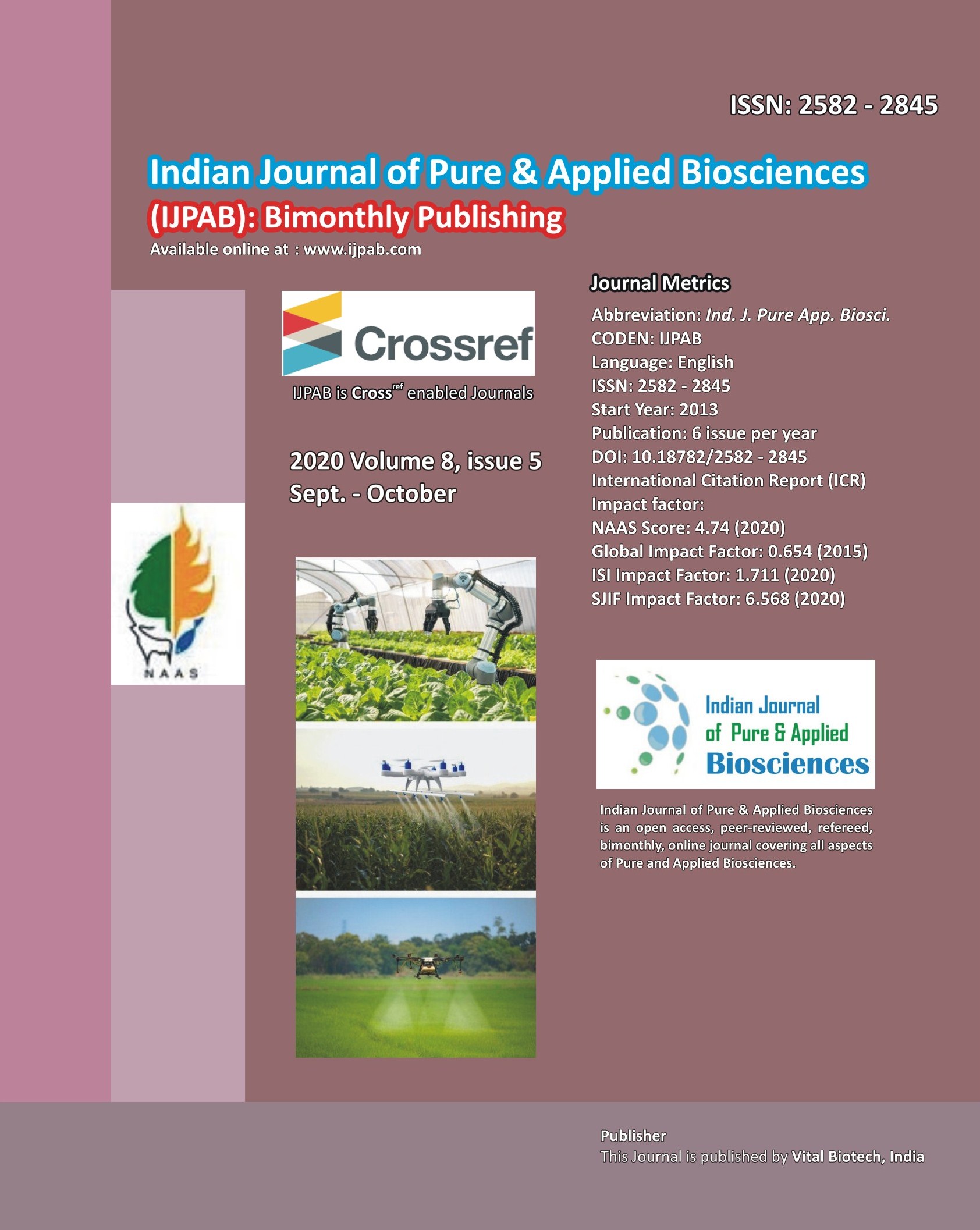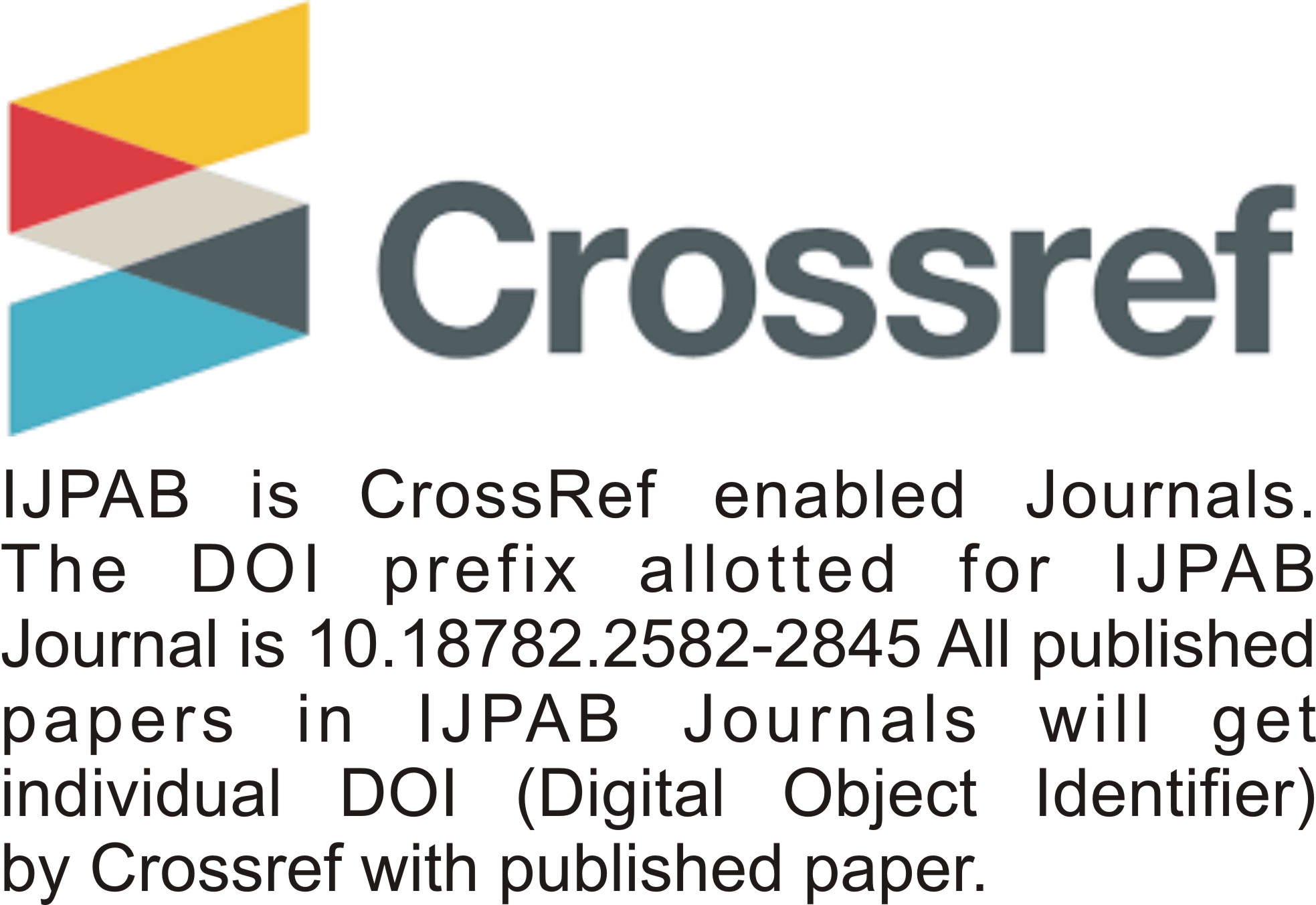
-
No. 772, Basant Vihar, Kota
Rajasthan-324009 India
-
Call Us On
+91 9784677044
-
Mail Us @
editor@ijpab.com
Indian Journal of Pure & Applied Biosciences (IJPAB)
Year : 2020, Volume : 8, Issue : 5
First page : (150) Last page : (152)
Article doi: : http://dx.doi.org/10.18782/2582-2845.8317
Attitude of Trainees towards KVK Training Programmes in Tamil Nadu
Ramakrishnan. K1* ![]() , Sakunthalai. A2 and V.K. Paulpandi3
, Sakunthalai. A2 and V.K. Paulpandi3
1Assistant Professor (Agrl. Extension), DAE & RS AC & RI, Madurai - 625104
2Frofessor (Extension), AEC&RI, Trichirapalli – 621712
3Dean, AC & RI, Madurai - 625104
*Corresponding Author E-mail: ramki.vnr@gmail.com
Received: 4.08.2020 | Revised: 13.09.2020 | Accepted: 17.09.2020
ABSTRACT
Krishi Vigyan Kendra is a Government of India funded Indian Council Agricultural Research Project implemented at district level for enhancing the productivity and livelihood through scientific extension works. Realizing the importance of technology dissemination in the changing scenario of food and nutritional security, ICAR intervened in a big way. All the firstline extension projects were merged and brought under single umbrella of Krishi Vigyan Kendra. The major emphasis was to enhance the production and productivity as well as to generate household income and employment of farming community. Krishi Vigyan Kendra conducts on-farm testing to identify the location specificity of agricultural technologies under various farming systems and frontline demonstrations to establish its production potentials on the farmers’ fields. It trains the farmers to update their knowledge and skills in modern agricultural technologies and trains extension personnel to orient them in the frontier areas of technology development. In social research, attitude of a person or group towards social problems or any psychological object is of paramount importance. Attitude defined as the degree of positive or negative effect associated with some psychological object. The attitude of trainees towards KVK was measured with the help of scale developed specially for the purpose. The trainees were categorized into three groups viz., less favourable, favourable and more favourable groups based on frequency and percentage.
Keywords: KVK, NGO, Favourable, Farmers
Full Text : PDF; Journal doi : http://dx.doi.org/10.18782
Cite this article: Ramakrishnan, K., Sakunthalai, A., & Paulpandi, V. K. (2020). Attitude of Trainees towards KVK Training Programmes in Tamil Nadu, Ind. J. Pure App. Biosci. 8(5), 150-152. doi: http://dx.doi.org/10.18782/2582-2845.8317
INTRODUCTION
Krishi Vigyan Kendras are the effective agency in implementing the training programmes especially for farmers, farm women and Rural youths with the financial assistance of Indian Council of Agricultural Research, New Delhi with a view to strengthen the economic position of farmers in the society. This is done through upgradation of knowledge on relevant agricultural knowledge besides assisting in development of positive attitude through practical training to farmers. Success of trained farmers would act as a catalyst to spread their experience to other farmers to participate in future training programmes. Unless the attitude of the trainees was positive and relevant of them, the future trainees participating in the training programmes will be futile.
MATERIALS AND METHODS
Attitude of trainees towards KVK training programmes was measured by the scale developed for the study.
Sampling procedure
Selection of Krishi Vigyan Kendras
In Tamil Nadu, there are 30 Krishi Vigyan Kendras are in operation. Among he 30 Krishi Vigyan Kendras, 14 Krishi Vigyan Kendras are managed by Tamil Nadu Agricultural University, Coimbatore- 3, 3 Krishi Vigyan Kendras under Tamil Nadu University of Vertenary and Animal Science, Chennai and the 13 Krishi Vigyan Kendras are being managed by NGO/Trust. All the Krishi Vigyan Kendras have been working with the financial support of ICAR and the mandates set by the ICAR, New Delhi. These Krishi Vigyan Kendras comes under the Zone – VIII, Zonal Project Directorate, Bangalore.
Names of Krishi Vigyan Kendras selected for the study
S.No |
Name of the Krishi Vigyan Kendras |
No. of trainees |
Krishi Vigyan Kendras, Virudhunagar (TNAU) |
20 |
|
Krishi Vigyan Kendras, Kancheepuram (TANUVAS) |
20 |
|
Krishi Vigyan Kendras, Theni (NGO) |
20 |
Trainees sample
The main focus of all training activities is on the trainees. So 20 trainees who have participated in a structured training programme of 3 days duration or move were selected from Krishi Vigyan Kendras, Virudhunagar (TNAU), Krishi Vigyan Kendras, Kancheepuram (TANUVAS) and Krishi Vigyan Kendras, Theni (NGO), put together 60 trainees will serve as the sample for the study.
The final attitude scale was administered to trainees to study their attitude towards Krishi Vigyan Kendras training programmes. The respondents were requested to rate each statement on a five point continuum viz., Strongly agree, agree, undecided, disagree, and strongly disagree with scores 5,4,3,2 and 1 respectively for negative statements. The sum of scores on all statements formed the attitude score of the respondents. The minimum and maximum score was 12 and 60 respectively.
Categorization of the trainees
After getting the total attitude score, the trainees were classified in to three groups as follows.
- Less favourable --- <(Mean – SD)
- Favourable --- Mean ± SD
- More favourable --- (Mean + SD)
The schedule was pretested and dates was collected through personnel interview method in selected all three KVK’s of Tamil Nadu. The data were coded, tabulated.
RESULTS AND DISCUSSION
A successful training programme must secure a favourable attitude by the group. The farmers training programme is in no way exception to this general norm. The attitude of trainees towards KVK was measured with the help of scale developed specially for the purpose. The trainees were categorized into three groups viz., less favourable, favourable and more favourable groups based on frequency and percentage and was presented in table 1.
Table 1: Distribution of trainees according to their attitude towards KVK training programmes
n=60
S.No |
Category |
Frequency |
Percentage |
Less favourable |
9 |
15.00 |
|
Favourable |
35 |
58.33 |
|
More favourable |
16 |
26.67 |
|
|
Total |
60 |
100 |
It could be seen from the table 1 that 58.33 per cent of trainees had favourable attitude followed by 26.67 per cent with more favourable and 15.00 per cent with less favourable attitude towards KVK training programme. The usefulness of the training, systematic way of dealing the subject, effective skill teaching and other factors associated with the training would have been the major reasons for having favourable attitude towards KVK training. Hence it may be concluded that there exists the favourable attitude of trainees indicating the existence of lot of scope for the trainees to organize periodical trainings to farm women to improve the knowledge level and skills of farm women. This result is in accordance with the result of Sundarajan (1985), Muthammal (1997) and Arunadevi (1998).
CONCLUSION
Finally it can be concluded that the KVK training programmes were quite effective in increasing the favourable attitude by the trainees.
REFERENCES
Mohanraj, V. (2019). “Multi-Dimensional Analysis on Arecanut Growers in Salem District of Tamil Nadu”. M.Sc. (Ag.) Thesis, AC&RI, TNAU, Madurai.
Sruthi Mahalakshmi, P. (2019). “A study on market-oriented farming among the curry leaf growers on the Western Zone of Tamil Nadu”. M.Sc. (Ag.) Thesis, AC&RI, TNAU, Madurai.
Santhiya, P. (2018). “Explorative study on Market-oriented Groundnut cultivation in Namakkal District”. M.Sc. (Ag.) Thesis, AC&RI, TNAU, Madurai.
Revathi, S. (2017). “A study on Insect Pest Management Practices of Farmers in Vegetable Crops.” M.Sc. (Ag.) Thesis, AC&RI, TNAU, Madurai.
Kavinila, M. (2016). “A study on Aspirations and Attitude of rural Youth in Agriculture”. M.Sc. (Ag.) Thesis, AC&RI, TNAU, Madurai.
Masanaselvam, T. (2016). “n Analytical Study on Farmers Practicing System of Rice Intensification (SRI) in Thamirabarani Command Area of Tamil Nadu”. Ph.D Thesis, AC&RI, TNAU, Madurai.

